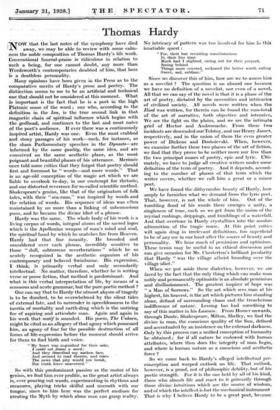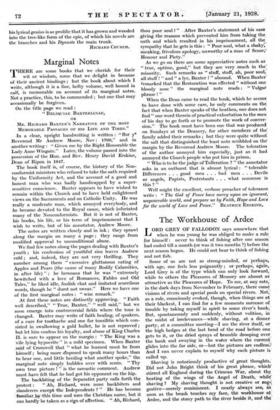Thomas Hardy
NOW that the last notes of the symphony have died 1 away, we may be able to review with some calm- ness the noble composition of Thomas Hardy's life work. Conventional funeral-praise is ridiculous in relation to such a being, for one cannot doubt, any more than Wordsworth's contemporaries doubted of him, that here is a deathless personality.
Many opinions have been given in the Press as to the comparative merits of Hardy's prose and poetry. The distinction seems to me to be an artificial and technical one that should not be considered at this moment. What is important is the fact that he is a poet in the high Platonic sense of the word ; one who, according to the definition in the Ion, is the true second link in that magnetic chain of spiritual influence which begins with the godhead, and continues to the last and most naive of the poet's audience. If ever there was a continuously inspired artist, Hardy was one. Even the most crabbed and stony passages of his work—such, for instance, as the sham Parliamentary speeches in the Dynasts—are informed by the same quality, the same idea, and are conceived on the same aesthetic plane, as the most poignant and beautiful phases of his utterance. Merimee once told some critics that they forgot that poetry should first and foremost be "words—and more words." That is an age-old conception of the magic art which we are liable to overlook to-day, in our contempt for rhetoric, and our distorted reverence for so-called scientific method. Shakespeare's genius, like that of the originators of folk tales, with their "sea-runs," was inspired by words and the relation of words. His sequence of ideas was cften maintained by no more than a linking of subconscious puns, and he became the divine idiot of a phrase.
Hardy was the same. The whole body of his work is a living corpus of words, integral atoms of the sacred logos which is the Apollonian weapon of man's mind and soul, the spiritual hand by which he snatches fire from Heaven. Hardy had that fine insanity. He brooded and smouldered over each phrase, incredibly sensitive to those "dull, subterrene reverberations" which he so acutely recognized in the aesthetic organism of his contemporary and beloved Swinburne. His expression, I think, is- primarily verbal and only secondarily intellectual. - No matter, therefore, whether he is writing verse or prose fiction, that method is predominant. And what is this verbal interpretation of life, by means of a sensuous and acute grammar, but the pure poetic method ?
One can say that to Hardy the utmost abysm of tragedy is to be dumbed, to be overwhelmed by the silent tides of external fate, and to surrender in speechlessness to the inertia of mortality and earth-drag which is the untiring foe of aspiring and articulate man. Again and again in his work that- motif is sounded. His poem, The Unborn, might be cited as an allegory of that agony which possessed him, an agony of fear for the possible destruction of all forms of life-expression before the moment should arrive for them- to find birth and voice:
" My' heart was anguished for their sake, . I could nog, frame a word; And they described my sunken face, And seemed to read therein, and trace • The news that pity would not break, Nor truth leave unaverred."
So with this predominant passion as the motor of his genius,,we find him ever prolific, as the great artist always is, ever pouring out words, experimenting in rhythms and measures, playing tricks skilful. and uncouth with our tongue, since to .him here was the perfect medium for creating the Myth by which alone man can grasp reality. No intricacy of pattern was too invoked for him in this insatiable quest :
"For, their lost revisiting manifestations In their live time Much had I slighted, caring not for their purport., Seeing behind Things more coveted, reckoned the better worth calling Sweet, sad, sublime."
Since we discover this of him, how are we to assess him as a novelist ? The question is an absurd one because we have no definition of a novelist, nor even of a novel. All that we can say of the novel is that it is a phase of the art of poetry, dictated by the necessities and intricacies of civilized society. All novels were written when the Iliad was written, for therein can be found the sum-total of the art of narrative, both objective and intensive. We see the fight on the plains, and we see the intimate grief of Hector and Andromache. From these two incidents are descended our Tolstoy, and our Henry James, respectively, and in the union of them the even greater power of Dickens and Dostoievski. When, however, we examine further these two phases of the art of fiction, we find that they prove to be neither more nor less than the two principal muses of poetry, epic and lyric. Ulti- mately, we have to judge all creative writers under some definition of the term of poetry. And it depends, accord- ing to the number of phases of that term which the writer covers, whether we call him a great or a minor poet.
We have found the dithyrambic beauty of Hardy, how amply he furnishes what we demand from the lyric .poet.
That, however, is not the whole of him. Out of the tumbling flood of his words there emerges a unity, a singleness of tone, such as we get from the union of the myriad rushings, drippings, and tumblings of a waterfall.
And that overtone in Hardy crystallizes into the sombre admonition of the tragic muse. At this point critics will again drag in irrelevant definitions, too superficial to be of any use in our hunt after the source of beauty and personality. We hear much of pessimism and optimism.
These terms may be useful in an ethical discussion and can give occasion for Mr. Chesterton's brilliant jocularity that Hardy. "was the village atheist brooding over the village idiot."
When we put aside these dialectics, however, we arc faced by the fact that the only thing which can make man nobly and permanently optimistic is an absolute pessimism and disillusionment. The greatest inspirer of hope was "a Man of Sorrows." So the art which sees man at his highest, his bravest, is the art which pictures him standing alone, defiant of surrounding chaos and the treacherous indifference of nature. Lessing has had something to say of this matter in his Laocolin. From Homer onwards, through Dante, Shakespeare, Milton, Shelley, we find the divine in man, the conscious quality of the Sun, defined and accentuated by an insistence on the external darkness.
Only by this process can a unified conception of humanity be obtained.; for if all nature be endowed with human attributes, where then does the integrity of man begin, and where is human nature as a conscious and aesthetic force ?
So we come back to Hardy's alleged intellectual pre- conception and warped outlook on life. That outlook, however, is a proof, not of philosophic debility, but of his poetic strength. For it is the one held by all of his kind, those who absorb life and react to it primarily through those divine. intuitions which are the source of wisdom, and ofwhich the intellect is but the mechanical instrument That is why I believe Hardy to be a great poet, because his lyrical genius is_so prolific that it has grown andwooded into the tree-like form of the epic, of which his novels are the branches and his Dynasts the main trunk.
RICHARD CHURCH.







































 Previous page
Previous page